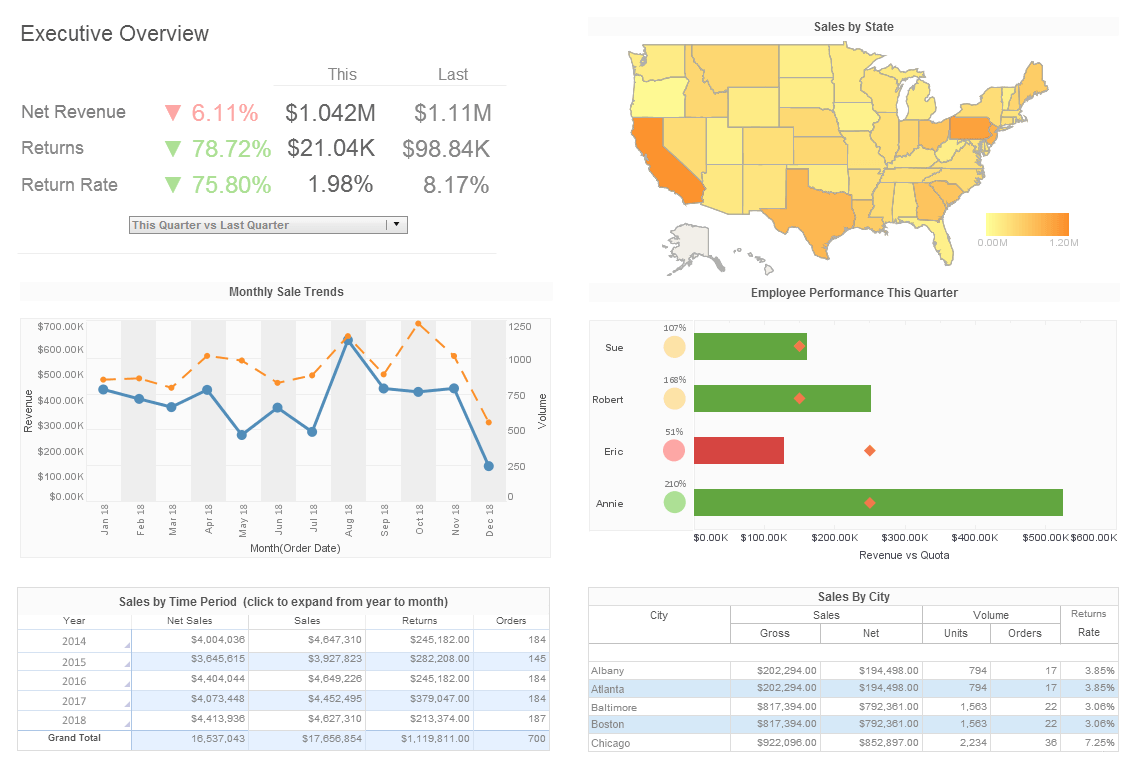The Second Stupid Performance Measurement Mistake
This is the transcript of a Webinar hosted by InetSoft on the topic of "Business Intelligence Agility" The speaker is Mark Flaherty, CMO at InetSoft.
The second stupid performance measurement mistake is using annual metrics. We don’t have any of these in the finance area. We track performance daily, weekly, sometimes even hourly. You can’t run an organization by measuring performance once a year, but that’s how we measure things like customer satisfaction, employee satisfaction as we do a once a year survey. An annual metric has no place on your scorecard. Annual metrics are good for studies but unless you can measure performance at least quarterly, it doesn’t need to be on your scorecard. It’s something you track to supplement your scorecard data.
A trend going on in industry right now, and some government folks are starting to pick up on this as well, is a metric they call Net Promoter Score. It’s a fancy name for a one-question survey. On a scale of 1 to 10, would you recommend us as a great place to shop, or would you recommend this as a good car to buy?
The problem with these one-question surveys is that if you end up getting an average of four on a ten point scale, you have no idea why. So the data is not usable. You can’t use it to solve problems. You can’t use it to figure out what you’re doing well.
| #1 Ranking: Read how InetSoft was rated #1 for user adoption in G2's user survey-based index | Read More |
The rule of this is that it’s simple, and the idea is more people will answer one question than if you send them 20 or 30 questions, but the downside of it is you can’t do anything with the information. You can’t use it for diagnostic purposes.
If you’re doing a Net Promoter Score type of survey, I would encourage you to continue doing it if you get a good response, but I certainly wouldn’t rely on it as my only measure. I would supplement it with other data that you could do diagnostics on. The number four mistake is supercilious process measures. Right now, a lot of companies are into managing their processes rather than managing and measuring just the outputs and outcomes so the idea is if you measure the process then the outcome will be good. But I see a lot of supercilious process measures out there. In other words, people behave in the way that they are expected to behave, but it doesn’t produce the desired result.
You need to make sure that whatever behavior measures you’re tracking, whatever process measures that you have, link them to the outcome, or people are going to behave in the way you expect them to and then not produce anything of value.
Number five, I have not seen any scorecards recently, in the last five years, that have any measure of ethics or governance on them, and yet this is something that can put you out of business. It has put a lot of companies out of business, and it wasn’t on their balanced scorecards. They were looking at financial measures, and those were all green and customer measures were all green, and employee measures were all green. Then pretty soon, your executives are getting carted off in handcuffs. So ethics is something that is measurable. It’s hard to measure, but I have seen organizations develop some ethics gauges or metrics.
 |
View a 2-minute demonstration of InetSoft's easy, agile, and robust BI software. |
When you come up with your measures, in order to make them meaningful you have to set a target or a goal, or an objective. You can’t just have a number without knowing what that number should be, and I see a lot of arbitrary targets and strategic plans like 90 percent customer satisfaction or 10 percent cost reduction.
Targets should be based on the past. They should be based on what’s going on in your industry. They should be based on resource constraints. How many people or how much budget do you have, and things like that. Then you need to think about the side effects of achieving one target and maybe getting performance to degrade in another area. In other words, there ought to be a lot of science put behind how you set targets. You should never set them arbitrarily.
| Previous: How To Avoid Making Common Mistakes When Measuring Performance |


